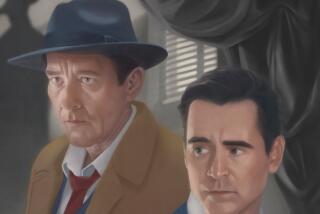Sharif undimmed by time in the heartfelt ‘Monsieur Ibrahim’
- Share via
With the blockbusters “Lawrence of Arabia,” “Dr. Zhivago” and “Funny Girl,” Omar Sharif became an international star. Sharif, an Egyptian-born actor of Lebanese descent, cut a romantic figure with his handsome looks, dark-eyed gaze and aura of worldliness. For years he kept busy in Europe and America, but he never equaled the impact of that now-classic ‘60s trio and became one of the world’s top professional bridge players.
At 71 Sharif has returned to the screen with one of his best performances in one of the richest parts of his 50-year career. It is the title role of the heartfelt French film “Monsieur Ibrahim,” which is as intimate as the films that made him famous are epic. Eschewing vanity, Sharif appears his age, as a grizzled, white-haired grocer in a Paris working-class neighborhood in the 1960s. Despite the grocer’s nondescript, unstylish look and the paunch Sharif takes no pains to hide, he is as charismatic as ever. The fire in those dark eyes has not gone out, and he seems irreducibly, indestructibly a romantic figure. The great skill and judgment he brings to his nuanced playing of Ibrahim, a Turkish-born Muslim, lies in his ability to allow his own personality to inform rather than overwhelm this grocer, an unpretentious man rich in spirit rather than material wealth, a lover of women as much as of the Koran, which he constantly quotes.
The film initially focuses, however, not on Ibrahim but on Momo (Pierre Boulanger), a Jewish teenager who lives nearby in a small apartment with his dour intellectual father (Gilbert Melki, in an admirably uncompromising portrayal), who has not recovered from his wife’s departure years earlier and who takes out his misery on his son. As a result, a father-son bond grows between Ibrahim and Momo as his relationship with his actual father deteriorates.
Meanwhile, the fact that Momo lives on a street, the Rue Bleue, that is a popular hookers’ stroll, allows him to come of age with some notably attractive and considerate streetwalkers. That Momo is movie-star handsome does not hurt his cause and helps keep the working girls from sliding into the hooker-with-a-heart-of-gold stereotype. The filmmakers’ sense of humor helps here, as it does in the film’s more serious and emotional moments. Isabelle Adjani has a nifty pivotal cameo as Brigitte Bardot -- or a Bardot type -- whose newest movie has some location shots on the Rue Bleue.
Ibrahim takes a worldly, positive view of Momo’s sexual initiation yet deftly balances this key experience for Momo with a fervent but not preachy spirituality. He conveys to Momo that the wisdom of the Koran can be an enthralling discovery. The friendship between the lonely boy and the lonely longtime widower flowers, yet Momo still has time to begin courting the redheaded girl (Lola Naymark) who lives across the street. Plot developments, however, send Momo and Ibrahim off on an unexpected journey to Turkey.
What a minefield director Francois Dupeyron and his co-writer, Eric-Emmanuel Schmitt, have created for themselves in adapting Schmitt’s play -- and by and large they manage artfully to skirt it. Dupeyron’s direction of Sharif and Boulanger is sensitive yet firm; in Sharif there is always a crucial sense of what’s being held in reserve, and in Boulanger a sense of Momo’s gradual awakening to life’s possibilities. Just as Moshe Mizrahi kept a check on the mawkish in his 1977 “Madame Rosa,” in which Simone Signoret was superb as an aged ex-prostitute, an Auschwitz survivor who struggles to support herself by caring for a little Arab boy, so does Dupeyron with his film.
The foray into Turkey takes the film on a dangerously sentimental swerve, yet again the filmmakers’ and their stars’ discipline stand fast, enabling “Monsieur Ibrahim” to express an ecumenical spirit in a most understated way at a time in which such a sentiment could scarcely be more welcome. Dupeyron’s one note of heavy-handedness occurs in his persistent use of loud American pop hits of the ‘60s as his score.
“Monsieur Ibrahim” has a deceptively neat and actually ironic coda that suggests it is worthy to set modest goals for oneself in a world that seems to demand an ever-increasingly competitive spirit to survive. The film insists that what is important is the interior life of the individual, the cultivation of a deep spirituality. Surely there is room in the movies for a small film with an unabashed, even old-fashioned but timeless humanist spirit -- and a triumphant portrayal by a veteran star that is likely to be regarded as one of the year’s best.
*
‘Monsieur Ibrahim’
MPAA rating: R, for some sexual content
Times guidelines: Adult fare suitable for sophisticated teenagers
Omar Sharif...Monsieur Ibrahim
Pierre Boulanger...Momo
Gilbert Melki...Momo’s father
Lola Naymark...Myriam
Isabelle Adjani...”La Star”
A Sony Pictures Classics release of an ARP production co-produced with France 3 Cinema with the participation of Canal Plus. Director Francois Dupeyron. Producers Michele and Laurent Petin. Adapted from the play by Eric-Emmanuel Schmitt, with dialogue by Dupeyron and Schmitt. Cinematographer Remy Chevrin. Editor Dominique Faysse. Costumes Catherine Bouchard. Production designers Katia Wyszkop, Francis Barrois. In French and Turkish with English subtitles.
Exclusively at the Sunset 5, 8000 Sunset Blvd., West Hollywood, (323) 848-3500.
More to Read
Only good movies
Get the Indie Focus newsletter, Mark Olsen's weekly guide to the world of cinema.
You may occasionally receive promotional content from the Los Angeles Times.










